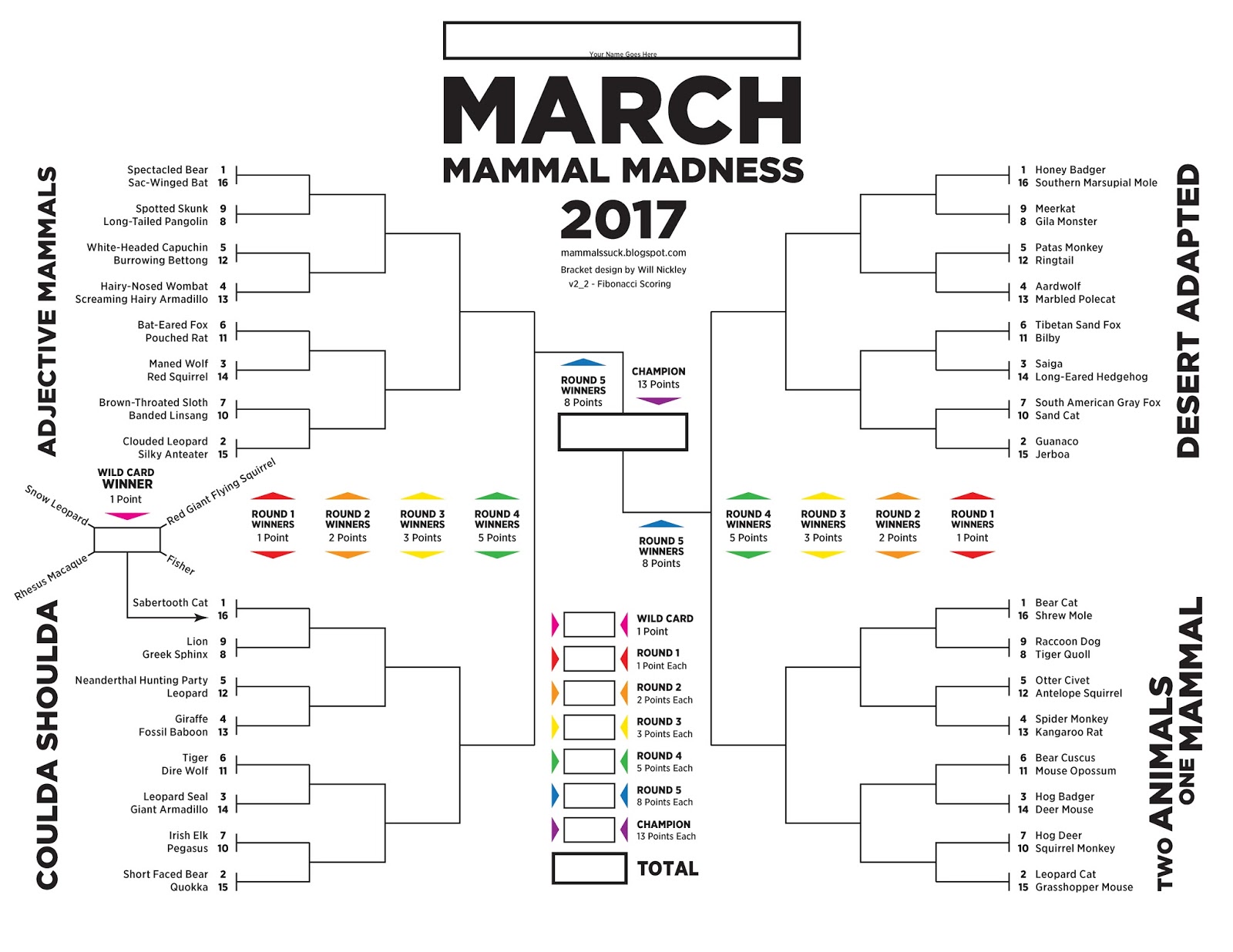March Mammal Madness, Science Communication's "Big Dance," Is Back
By David Samuel Shiffman
The annual Twitter event returns with 64 mammal species ready to fight to the virtual death for your entertainment and education.
March 6, 2017
Macroscope Biology Communications Animal Behavior
For both sports fans and science fans, March is the most wonderful time of the year. The 5th annual March Mammal Madness, a science education event on Twitter modeled after college basketball’s March Madness (NCAA Division I Men’s Basketball Tournament), starts today!
A team of scientists picked 64 species of animals, which are divided into four themed divisions. These animals will fight to the virtual death in simulated combat in a March Madness–style single elimination tournament, with play-by-play called on Twitter over the course of March. The animals don’t actually fight, of course. Instead, the outcomes of each matchup are determined via a random number generator that factors in relative advantages of each species involved in a matchup. The resulting outcome is spun into a dramatic, entertaining, and informative narrative by the March Mammal Madness narrators.
As fans cheer on their favorites with nerdy trash talk, they also learn about these incredible animals. “Primary scientific literature is used to substantiate likely outcomes should two animals or two groups of animals encounter one another,” says Chris Anderson, an assistant professor at Dominican University and a battle narrator for March Mammal Madness since 2014. Sometimes the older primary literature includes hilarious descriptions. For example, a 1937 paper about pandas that referred to them as “not alert” and “an extremely stupid beast.” The hashtag #WorstBear was used to describe pandas in subsequent March Mammal Madness battles.

March Mammal Madness has garnered fans of all ages. “I love seeing all the pictures on Twitter of folks filling in their brackets—kids doing research, lab groups arguing about the impact of a battle location, families debating around the kitchen table,” says Katie Hinde, an associate professor at Arizona State University and the founder of March Mammal Madness. “Apparently trash talk crosses all generations and demographics.” She reports in a recent blog post that more than 200 teachers from all over the world requested an early copy of the brackets this year.
This year’s divisions are desert-adapted mammals; adjective-named mammals such as the “clouded leopard” and “silky anteater”; mammals whose names are combinations of more than one animal such as the “bear cat” and the “grasshopper mouse”; and returning fan favorites in the coulda-shoulda bracket that didn’t quite make the cut in previous years. Some past fan favorites, such as Walter the Paraceratherium in 2014, even resulted in T-shirts.
For the five-year anniversary, March Mammal Madness 2017 is going to be even bigger and more topical. “We are also going to do more to highlight national parks, environmental protections, #actuallivingscientists, and science funding throughout the tournament,” Hinde wrote in the introductory blog post. “March Mammal Madness is a love letter to the science community and a love letter about science. And this love letter is needed now more than ever.”
How to Participate
Fill out your March Madness–style bracket before the wild-card match tonight, and follow along with the action as it’s called on Twitter! Follow the hashtag #2017MMM and the official Twitter account @2017MMMletsgo. If you want to join in the conversation, make sure to use hashtag #2017MMM—and remember, science-y trash talk is strongly encouraged.
The Schedule
Date | Matches |
Monday 3/6 | Wild Card/Play-In |
Wednesday 3/8 | Adjectives, Round One |
Thursday 3/9 | Desert, Round One |
Monday 3/13 | Coulda Shoulda, Round One |
Tuesday 3/14 | Two/One Round One |
Thursday 3/16 | Adjective and Desert, Round Two |
Monday 3/20 | Coulda Should and Two/One, Round Two |
Tuesday 3/21 | Sweet 16 |
Thursday 3/23 | Elite Trait |
Monday 3/27 | Final Roar |
Wednesday 3/29 | Championship |
Author’s note: The author was a coauthor with Mammal March Madness co-organizer Joshua Drew on an unrelated project in 2013.
American Scientist Comments and Discussion
To discuss our articles or comment on them, please share them and tag American Scientist on social media platforms. Here are links to our profiles on Twitter, Facebook, and LinkedIn.
If we re-share your post, we will moderate comments/discussion following our comments policy.